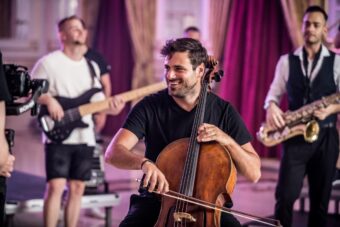Since last Sunday’s Grammys ceremony, featuring Skrillex’s hat trick (but, alas, no Best New Artist trophy) and a colossal head-scratcher of a spectacle featuring dance icons David Guetta and Deadmau5, one question has come up repeatedly across Internet message boards: What does it all mean for electronic dance music?
I’ll tell you: not much. But not for the reasons you think.
Being a denizen of dance music’s numerous niches for most of my professional life, I’ve done scads of these state-of-the-scene snapshots, and if there’s one thing I’ve learned, it’s that there is no one thing we can conveniently bundle up and call “electronic dance music.” There are a million little scenes, sounds, tendencies, ideals, ethics — some at odds, some running in parallel, some overlapping in strange ways.
Consider just one example of the ways that dance-music cultures exist on planes so distant that you’d need quantum physics to map them: I live in Berlin, which means that in order to watch the Grammys, I needed to wake up at 5:30 Monday morning here to tune in to the live broadcast. At that hour, a few kilometers from my apartment, the last stragglers were leaving Berlin’s Berghain, widely considered the world capital of underground techno. That’s right: 5:30 in the morning on a Monday, the clubbers are still at it. It’s hardly uncommon here to wake up on a Sunday and head to Berghain for a breakfast of Red Bull and vodka, then dance away the afternoon, evening, and whatever comes next. In fact, that’s a local point of pride; arriving at a club before six in the morning is what tourists do. Inside the club, a mixed clientele dances to an adventurous blend of vintage house, cutting-edge techno, and everything in between. DJs are expected to take risks in their sets, and they’re given up to eight-hour time slots for that very purpose. There are no spotlights on the DJs, though, and no go-go dancers. All of the energy is on the music, on the dance floor, in the pulse in your veins and the sweat on your forehead.
Contrast this scene with what was happening a world away, inside the Grammys’ dance tent, a.k.a. the Haze Nightclub at Staples Center, produced by the Las Vegas super-club of the same name: an awkward face-off between Guetta, Foo Fighters, and Deadmau5, with negligible vocal contributions from Lil Wayne and a convicted woman-puncher, -biter and -throttler — so much for rave culture’s embrace of PLUR. (Maybe someone’s still got a restraining order on Chris Brown’s singing voice, because the performance was pure playback.)
What had looked like a bad idea on paper, before the ceremony, turned out to be a train wreck in practice.
There was David Guetta, flopping about like a Muppet behind the mixer, jabbing away at the controls in a pantomime of performance. What was all that flicking of the faders and tweaking of the knobs about? Why was he wearing his headphones over one ear, as though he were cueing up the next record? During the French superstar’s time onstage, only one song (“I Can Only Imagine,” from his Nothing But The Beat, which features Chris Brown and Lil Wayne in its album version) was played. Simply put, there were absolutely no services required of him that a DJ would traditionally provide. He might have tweaked a filter here or there or cut out the bass a time or two, but that was the extent of his interventions. (No matter what he’s doing with his hands, you never hear an appreciable change in the music or note any kind of cause/effect relationship.)
Mainly, his role was to grin and mug for the crowd, which is pretty much what Deadmau5 did as well, except this time, even his facial expressions were outsourced to the designers who programmed the LED array on his big ol’ mousehead. (Was it just me, or did Deadmau5 spend a lot of time winking? Was that a glitch, or some attempt at irony?) We never got to see Deadmau5′ hands as he took over from Foo Fighters to play his “Raise Your Weapon,” which was just as well; his contributions also looked and sounded pretty negligible. (And what about those disembodied vocals? Did Greta Svabo Bech, the song’s featured vocalist, have more pressing commitments?)
I know it’s not cool to get too hung up on “authenticity,” but this was not what dance-music culture looks or feels like. Most DJs and laptop performers actually do something onstage.
I don’t want to come across as rockist, but this matters. And to pretend otherwise, and try to cover it up with dance steps and glow sticks and an uncomfortable, kind-of-almost-but-not-really mash-up between Deadmau5 and Foo Fighters, is to treat dance music as just another fad to be chewed up by Big Entertainment and bottled up like a noxious pot of [5-Hour Energy. (I tried that stuff when I went to report on Skrillex at Electric Daisy Carnival, by the way. Not recommended — all the bad parts of drugs, with none of the good. Sort of like the Grammys’ dance-music tribute.)
About that Foo Fighters appearance, something made all the weirder by Dave Grohl’s frequent fuming about how computers have no place in “real” music: What on earth were they doing there? Were they a sop to viewers who would otherwise be turned off by the presence of a DJ onstage? Were the show’s producers going for a history-making genre crossover on the scale of Aerosmith with Run-DMC? Not only did they not hit that; they didn’t even manage Judgment Night.
It was the worst kind of synergy — tacked on, instead of truly integrated. It was awkward, and it made everybody look bad, not least Grohl, who the cameras caught rather grimly bobbing in place while Deadmau5 finished up the set.
Of course, you can tell me that I’m taking it all too seriously, that it’s just entertainment, a bit of spectacle. But the segment showed a total disregard for any of the things that make electronic dance music vital and exciting and innovative. It’s true that, given the format, it was bound to fail — a dance-music DJ needs hours, not minutes, to get across his or her ideas. But, given the constraints they had to work with, why couldn’t they have showcased someone like Araabmuzik, the trance-sampling MPC virtuoso? Or Robyn, who not only has a compelling stage presence, but knows how to translate her studio creations convincingly to the stage? Hell, why not at least have invited Skrillex up there? His performance might not have been any more “live,” but at least he’s got personality, where Guetta simpers and Deadmau5 sneers.
It’s a shame that they couldn’t have included the Dance/Electronic categories during the actual ceremony, rather than consigning them to the pre-broadcast. Sonny Moore seemed genuine in his insistence that the awards were a recognition of something larger than himself, as he marveled, “I think it’s awesome that we’re all getting recognized this year. There’s a lot of people that have been here before us doing what we’re doing. I think Justice’s Cross should have won a Grammy, I think Daft Punk should have won Grammys, but it’s cool that now this year it’s gonna open doors for everyone. There’s labels out there that have been doing what we’re doing for a long time, like Dub Police and Never Say Die, the list goes on.”
One Skrillex shout-out in particular stood out, to “all the Croydon dub guys that started this all in 2003.” He was talking about dubstep’s originators — people like Skream, Benga, and Artwork and all the DJs that came through Big Apple records in Croydon, South London, which served as a hub for the scene in its earliest days. A cynic might say that Moore was just trying to ride their coattails, but I thought it came off as a genuine sign of respect, even (especially?) given that Skrillex’s music has little to do with the template that they established. There was a lesson here, too, if any members of the Academy were listening: Wherever electronic dance music goes next, the seeds are being sewn in places like Croydon, Berlin, Brooklyn, Lisbon, and further afield — but not, certainly, at the Haze Nightclub at Staples Center.
Read our Skrillex cover story here.
More Grammys:
• The 2012 Grammys’ Highs and Lows: Didn’t We Almost Have It All
• Award Tour: 21 Times the Grammys Saluted the Underground
• Adele, Foo Fighters Dominate 2012 Grammy Awards

![[Photo: Robyn Beck/AFP/Getty]](https://www.spin.com/app/uploads/120223-skrillex-grammys.png)



